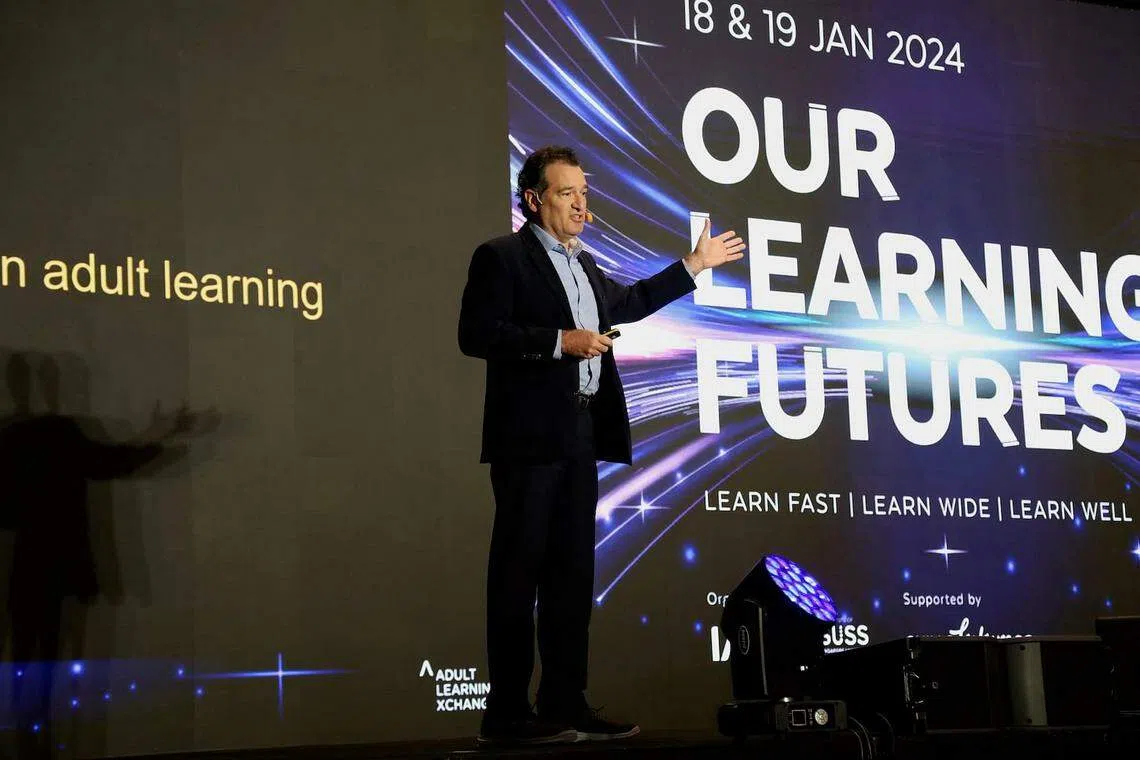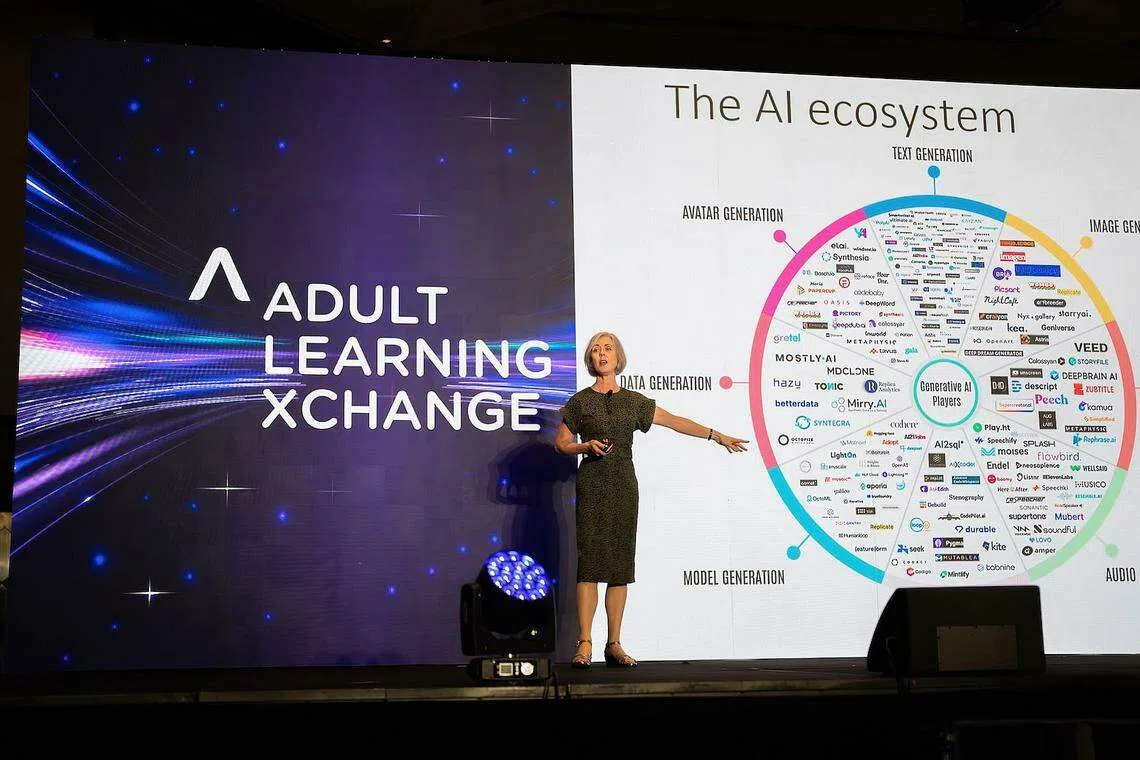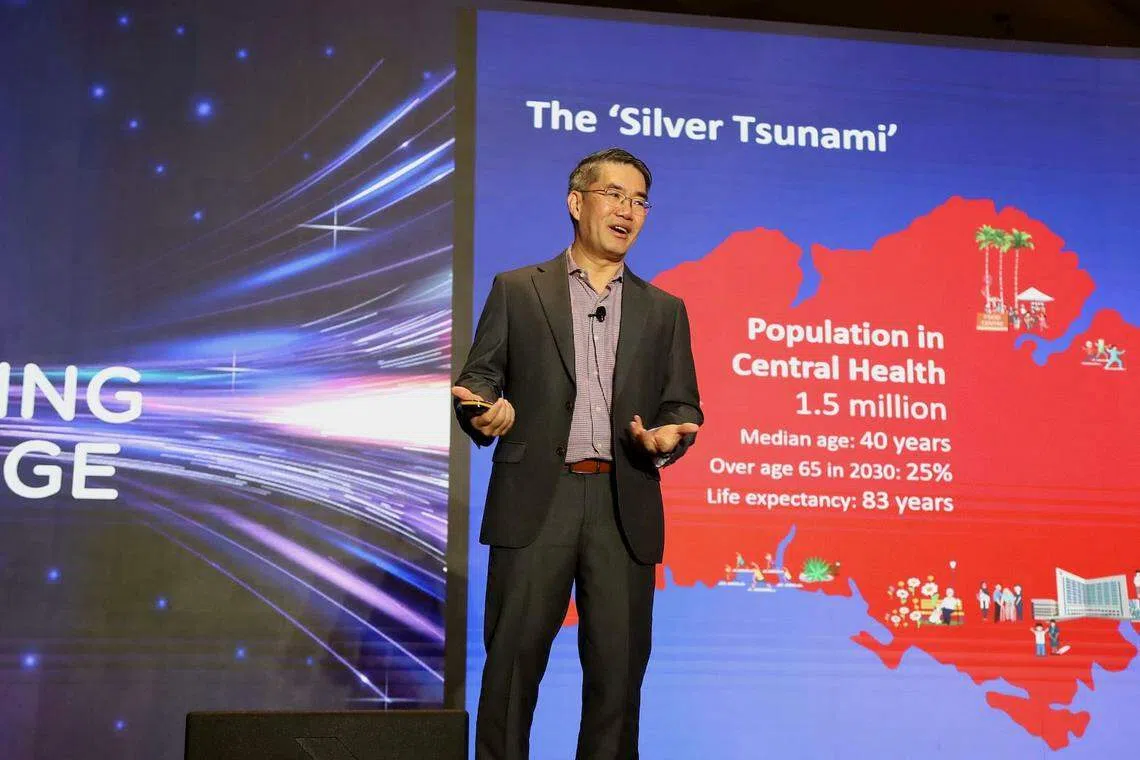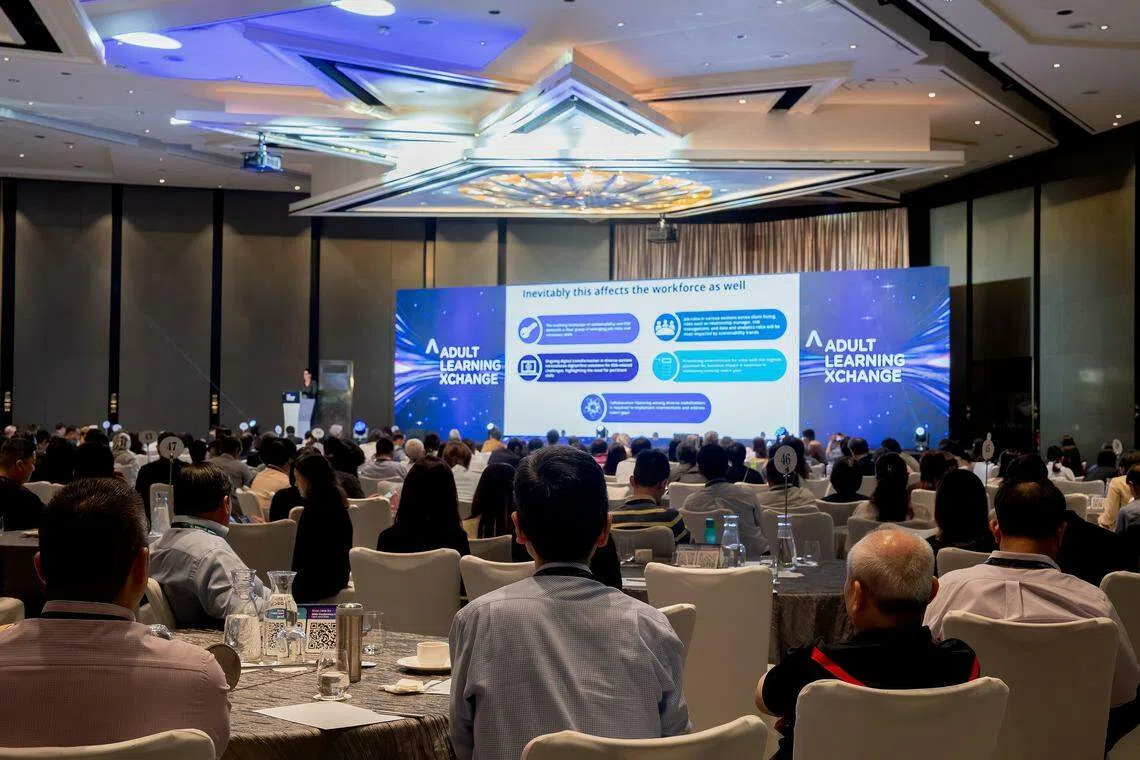The future of learning: Experts share tips on what you need to thrive in the AI era
Workers who learn to use AI will see an increase in their productivity and income, says a report by the International Monetary Fund
Faced with rapid change and challenges from tech and artificial intelligence (AI) disruptions, how can lifelong education adapt and improve to benefit workers and businesses?
It needs to help employees learn fast, wide and well, said global experts at the Adult Learning Xchange (ALX) 2024 organised by the Institute for Adult Learning (IAL).
Held on Jan 18 and 19 at the Raffles City Convention Centre, ALX 2024 was themed "Our learning futures: Learn fast, learn wide, learn well".
The event brought together over 500 industry experts and participants to explore the latest trends shaping the future of work and adult learning, and answer the key question: How do we create an effective adult learning model?
How we will work
Speakers at ALX 2024 noted the key trends shaping the future of work.
GET BT IN YOUR INBOX DAILY

Start and end each day with the latest news stories and analyses delivered straight to your inbox.
#1: From anywhere
And not just for roles that require only a laptop. While hybrid work may have become the norm for office workers, most roles in industries such as healthcare or manufacturing still require people to be physically present at work. Now, technologies like virtual reality are bridging this gap, said Mr Daniel Levine, a trends expert and director of US-based business consultancy Avant-Guide Institute. One example is the Microsoft HoloLens, a mixed-reality headset that enables doctors from hospitals all over the world to dial in virtually to examine patient computed tomography (CT) scans.

#2: Longer
Across the world, life expectancies are increasing. In Singapore, the life expectancy at birth was 64.5 years in 1965 and 83 years in 2022, according to figures from the Singapore Department of Statistics.
People are not just living longer, but also working longer. This shift gives rise to a group of workers in their "pre-retirement" phase. "These older workers are in their 60s or even 70s, but not quite ready to retire," said Mr Levine. As this segment grows, companies will have to understand and cater to their needs. For example, by actively reskilling older workers to help them stay relevant and providing greater flexibility in working arrangements.
#3: With AI
A year after the release of its viral AI chatbot ChatGPT, tech company OpenAI launched the GPT Store, allowing people to create and download custom generative pre-trained transformers (GPTs). These are large language models that can be trained to perform a broad range of tasks from creating original content to summarising text and extracting data from documents.
What does this mean for workplace efficiency?
Now, "you can create a custom GPT for every single role" in your company, said Professor B. Mairéad Pratschke, Chair in Digital Education, School of Arts, Languages and Cultures, Faculty of Humanities, University of Manchester. This allows you to "automate the (specific) tasks that you don't want to spend a lot of time doing".

The ABC of getting adult learning right
It's a race against time. You find yourself on the frontline as a new, unknown virus hits the country's shores.
The hospital faces unprecedented pressures as patients - both suspected and confirmed to be infected - stream in.
What do you do? In his keynote address, Mr Ronnie Yang, deputy executive director of the Centre for Healthcare Innovation hosted at the Tan Tock Seng Hospital (TTSH), offered insights into how the hospital handled the Covid-19 pandemic as Singapore's ground zero for the outbreak.
"While there was prior experience from handling previous health crises, no two viruses are the same," he said. "Standard operating procedures had to be constantly re-worked as and when new information about the (coronavirus) emerged."
Amid the crisis, TTSH's staff embraced an agile and nimble mindset, transforming the way they learn and care for patients while continuing to prioritise safety.
Nurses were trained in crucial tasks, such as wearing enhanced personal protective equipment and conducting polymerase chain reaction (PCR) tests, through a peer-to-peer teaching method. This enabled the knowledge and skills to be quickly imparted to the nursing staff across the hospital.
For TTSH, skills development is weaved into its workforce transformation and innovation thrust, Mr Yang said.

Faced with an ageing workforce and a manpower crunch in the healthcare sector, the hospital restructured processes, automated work and redesigned jobs to upskill and expand the roles of healthcare staff.
For example, TTSH was the first institution in Singapore to train selected nurses to perform intravitreal injections, which were previously done exclusively by ophthalmologists (eye doctors). These injections deliver sight-saving medication directly into the eyeball to treat certain conditions such as diabetic eye diseases.
The training process was rigorous, spanning three months, and with close guidance from experienced ophthalmologists. These highly trained nurses now handle the majority of the injections done at TTSH, allowing ophthalmologists to focus on other more complex procedures and patients whose conditions are more critical.
Describing the impact of these employee upskilling projects as "meaningful", Mr Yang said patients benefited from shorter waiting times for medical procedures. "We managed to uplift morale, expand capabilities and improve the retention of our workforce."
A robot makes a perfect cup of coffee each time. A chatbot churns out a dozen ideas for your next marketing proposal immediately. An image generator turns simple prompts into elaborate designs in seconds.
With AI and automation taking over tasks that human workers used to do, "we may all lose our jobs" is the headline of our time.
In an analysis published last month, the International Monetary Fund (IMF) said AI will affect almost 40 per cent of jobs around the world, replacing some and complementing others.
But Mr Simerjeet Singh, founder and director of Cutting Edge Learning Systems (CELS), pointed out that the same report shows that workers who learn to use AI will also see an increase in their productivity and income.
CELS, based in India, provides corporate training programmes, motivational talks and workshops on leadership and self-development.

So in the face of rapid changes, "take charge of your learning journeys, and never be afraid to start over", Mr Singh said. He emphasised the importance of adopting "shoshin" - a Japanese Zen concept meaning "beginner's mind" - in lifelong learning.
"Beginners dream big. In their minds, there are plenty of possibilities; but in the minds of experts, there are only a few," Mr Singh explained. "We must not get so caught up in our past successes and achievements that they prevent us from changing our minds."
As technology takes over more tasks at work, the value of human workers lies in the ability to empathise, Mr Singh advised. "It's about stepping outside your narrow zone of reference, and into the world of another to see how things are. What are the problems of this person? And how can I help?"
This will be a core skill that workers need to have in the AI era.
Beginners dream big. In their minds, there are plenty of possibilities; but in the minds of experts, there are only a few.
How do we know whether we are getting adult learning right?
"The learner is the best person to ask," said Mr Tan Kok Yam, chief executive of SSG and chairman of the IAL Council, emphasising that learners and employers are not passive recipients or beneficiaries of training. "(They) need to be given a hand to shape the lifelong learning system."
Similar to how continuous user testing and adaptation are adopted in modern software design, "we then use this feedback to continually enhance our programmes (and) cull away ineffective courses".
Singapore is putting in place a comprehensive nation-wide adult learner feedback system to achieve this effect, he added.
What, then, does an effective adult learning model look like? It is one that "builds confidence", Mr Tan said. Where individuals are confident they can master new skills or transition to a different career; and employers trust their workers to get the job done, even if they don't have the paper qualifications and past work experience.
"In an era where machine learning is making leaps and bounds, we must collectively make sure that we are no less confident in our ability to enable human learning."
This was produced in partnership with the Institute for Adult Learning.
KEYWORDS IN THIS ARTICLE
BT is now on Telegram!
For daily updates on weekdays and specially selected content for the weekend. Subscribe to t.me/BizTimes
Singapore
Shanmugam, Vivian seek aggravated damages from Lee Hsien Yang over post on Ridout Road rentals
Singapore and Canada to enhance science and technology cooperation
Daily Debrief: What Happened Today (May 2)
US-China competition not the most worrying, lack of communication is: Gan Kim Yong
Chee Hong Tat to join MAS board of directors
Singapore keen on ‘talent exchange’, developing AI ‘guard rails’ with the US
